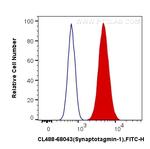Search Thermo Fisher Scientific
Proteintech
Synaptotagmin-1 Monoclonal Antibody (1H1H2), CoraLite® Plus 488
FIGURE: 1 / 1
Synaptotagmin-1 Antibody (CL488-68043) in Flow

Product Details
CL488-68043
Species Reactivity
Host/Isotype
Class
Type
Clone
Immunogen
Conjugate
Excitation/Emission Max
Form
Purification
Storage buffer
Contains
Storage conditions
Shipping conditions
Product Specific Information
Immunogen sequence: FCICKKCLFK KKNKKKGKEK GGKNAINMKD VKDLGKTMKD QALKDDDAET GLTDGEEKEE PKEEEKLGKL QYSLDYDFQN NQLLVGIIQA AELPALDMGG TSDPYVKVFL LPDKKKKFET KVHRKTLNPV FNEQFTFKVP YSELGGKTLV MAVYDFDRFS KHDIIGEFKV PMNTVDFGHV TEEWRDLQSA EKEEQEKLGD ICFSLRYVPT AGKLTVVILE AKNLKKMDVG GLSDPYVKIH LMQNGKRLKK KKTTIKKNTL NPYYNESFSF EVPFEQIQKV QVVVTVLDYD KIGKNDAIGK VFVGYNSTGA ELRHWSDMLA NPRRPIAQWH TLQVEEEVDA MLAVKK
Target Information
Synaptotagmin 1 is a synaptic vesicle membrane glycoprotein that is widely expressed throughout the CNS and is generally thought to act as the Ca2+ sensor in the regulation of exocytosis and neurotransmitter release. Studies indicate that synaptotagmin’s Ca2+ mediated binding of SNAP25 is essential for the Ca2+ dependent triggering of membrane. It has been demonstrated that discrete residues within the c(2)b binding domain of synaptotagmin 1 independently specify endocytic rate and synaptic vesicle size. Synaptotagmin 1 may have a regulatory role in the membrane interactions during trafficking of synaptic vesicles at the active zone of the synapse. Further, Synaptotagmin 1 binds acidic phospholipids with a specificity that requires the presence of both an acidic head group and a diacyl backbone. A Ca(2+)-dependent interaction between synaptotagmin and putative receptors for activated protein kinase C has been reported. Synaptotagmin 1 can also bind to at least three additional proteins in a Ca(2+)-independent manner; these are neurexins, syntaxin and AP2. Diseases associated with the dysfunction of Synaptotagmin 1 include food-borne botulism and infant botulism.
For Research Use Only. Not for use in diagnostic procedures. Not for resale without express authorization.
References (0)
Bioinformatics
Protein Aliases: DKFZp781D2042; FLJ42519; p65; SV DKFZp781D2042; SV SYT; Syb1; synaptic vesicle protein; synaptotagmin 1; synaptotagmin 2; Synaptotagmin I; synaptotagmin p65; Synaptotagmin-1; SYT2; SytI
Gene Aliases: AW124717; G630098F17Rik; P65; SVP65; synaptotagmin-1; SYT; SYT1; SytI
UniProt ID: (Chicken) P47191, (Human) P21579, (Rat) P21707, (Mouse) P46096
Entrez Gene ID: (Chicken) 396083, (Pig) 100513599, (Rabbit) 100350072, (Human) 6857, (Rat) 25716, (Mouse) 20979

Performance Guarantee
If an Invitrogen™ antibody doesn't perform as described on our website or datasheet,we'll replace the product at no cost to you, or provide you with a credit for a future purchase.*
Learn more
We're here to help
Get expert recommendations for common problems or connect directly with an on staff expert for technical assistance related to applications, equipment and general product use.
Contact tech support
